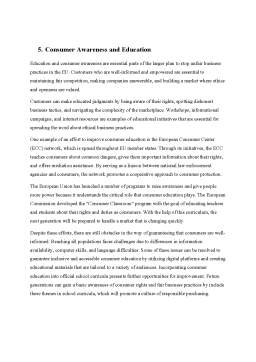Extras din referat
1. Introduction
The European Union (EU) stands as a unique and ambitious experiment in regional cooperation, founded on principles of economic integration, political collaboration, and the promotion of shared values among its member states. Ever since its establishment, the European Union has endeavored to establish a cohesive domestic market to promote unimpeded mobility of people, capital, products, and services. Establishing honest and open business procedures that protect the interests of consumers and companies is essential to the development of this internal market.
It is becoming more and more clear that unfair trade practices must be addressed as the EU develops. Unfair actions seriously undermine consumer confidence and trust, as well as the level playing field for enterprises. To maintain the smooth operation of the internal market and accomplish the larger objectives of the European project, it is now essential to comprehend and mitigate unfair business practices.
The EU is primarily concerned with defining and identifying unfair commercial practices. These practices can manifest in various forms, including deceptive advertising, aggressive sales tactics, and misleading product information. Beyond only influencing the economy, the consequences also affect citizens' well-being and the social fabric. Unfair business activities damage consumer confidence in the marketplace, obstruct fair competition, and ultimately threaten the core values that guide the EU's goals.
A thorough grasp of the existing legal and regulatory structures is necessary to address the issue. A key component of this effort is Directive 2005/29/EC, which addresses unfair business-to-consumer commercial activities. With a focus on consumer protection, this directive offers member states a comprehensive framework for regulating and combating unfair practices. However, given the changing nature of commercial activity and the rise of new difficulties in the digital age, a close review of this directive's efficiency in accomplishing its goals is necessary.
2. EU Consumer Protection Framework
The intricate architecture of consumer protection laws in the European Union is intended to protect consumers' rights and encourage just business conduct inside the internal market. Fundamentally, Directive 2005/29/EC—also referred to as the Unfair Commercial Practices Directive—is important. The objective of this directive is to create a unified market and increase consumer trust by standardizing legislation against unfair business-to-consumer commercial practices among member states.
A thorough examination of Directive 2005/29/EC is part of the scholarly investigation of the EU consumer protection framework. Scholars have closely examined the definitions and clauses of the directive, assessing how it affects national legal systems. For example, the order clearly enumerates 31 commercial practices—such as deceptive advertising, pushy sales techniques, and bait-and-switch tactics—that are considered unfair. Academic studies have sought to evaluate how member states incorporate these provisions into their national laws and the resultant implications for uniformity in consumer protection.
In addition to examining particular cases and situations, the literature on unfair commercial practices in the EU highlights how the Unfair Commercial Practices Directive is really put to use in practical situations. Illustrative instances are high-profile incidents, like those involving aggressive selling strategies or deceptive advertising claims. For instance, the directive explicitly condemns practices like falsely claiming that a product is only available for a very limited time to pressure consumers into an immediate decision.
Scholarly viewpoints have investigated the conceptual aspects of unfair practices, keeping up with the changing business environment. The directive's emphasis on deceptive omissions and its ban on making false statements about a product's availability are two examples of the complex issues that scholars have looked into. These studies offer a sophisticated interpretation of what injustice is, especially when considering e-commerce, digital marketing, and developing technology.
Following the approval of Directive 2005/29/EC, academics have studied particular facets of unfair business practices. Schmidt (2019), for example, has conducted research on the digital dimension, examining how digital marketing channels and online platforms have created new obstacles to recognizing and combating dishonest activities. This study highlights the necessity for regulatory frameworks to be continuously modified in order to keep up with the rapid advancement of technology.
Bibliografie
https://eur-lex.europa.eu/legal-content/EN/TXT/HTML/?uri=CELEX:32005L0029
https://www.gov.uk/government/organisations/competition-and-markets-authority/about
https://www.gov.pl/web/your-europe/unfair-commercial-practices
https://www.bbc.com/news/business-34324772
https://www.canada.ca/en/competition-bureau/news/2020/05/facebook-to-pay-9-million-penalty-to-settle-competition-bureau-concerns-about-misleading-privacy-claims.html
https://resources.latana.com/post/ryanair-deep-dive/
https://www.lemonde.fr/en/international/article/2023/09/27/amazon-sued-in-the-us-for-abusing-its-position_6140177_4.html
https://eismea.ec.europa.eu/programmes/single-market-programme/consumers/information-and-education_en
Preview document
Conținut arhivă zip
- Unfair commercial practices in EU.docx















